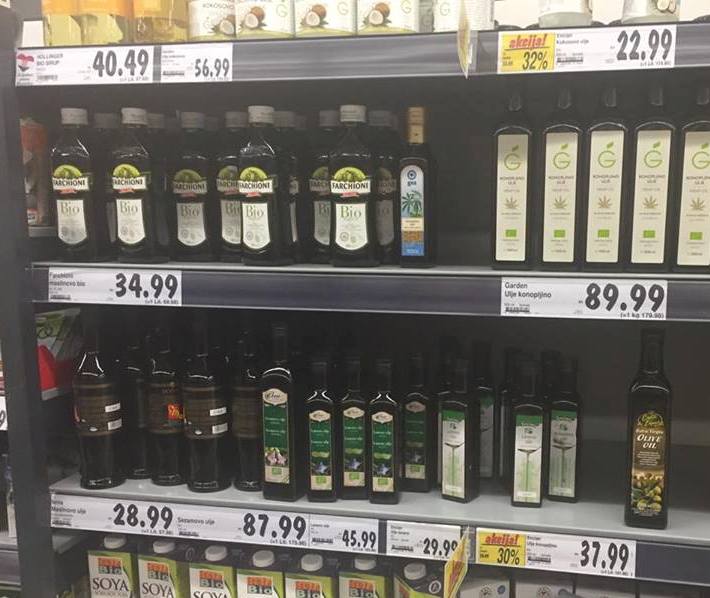If you want to buy Croatian olive oil you have to head to a German-owned retail chain
We all know Croatia produces some of the best olive oils in the world, and that’s not just our pride talking, Flos Olei named Istria the best olive region in the world only a few days ago. But, have you ever wondered how difficult it is to actually walk into a supermarket and buy real Croatian olive oil? Well, on March 9, 2016, we found out just how much footwork it takes to find a supermarket that sells it, at least in Split.
Once Croatia entered the EU, it became much easier to mask the origin of oil sold by our producers. All they have to do now is type Country of origin: EU on the declaration and they’re home free. But what an average consumer doesn’t know is that is if it says Country of origin, EU you can be pretty sure it’s not produced in Croatia. Let’s have a look, shall we?
Starting with the company that probably receives the biggest government incentives and owns the largest retail chain in the country. You’d think at least they would sell domestic oil. After all, their commercial just oozes Dalmatia with the klapa singing, crickets chirping and oops – Greek – salad on the table. Please don’t confuse this particular product with their Ol Dalmatia brand which is Croatian oil, but only available in their largest supermarkets, in fact, I couldn’t find it in their mid-size store here in Split.
And then we come to the actual product. Turn the bottle around and you guessed it. Country of origin EU. Next, please!

Retail chain NO.2, Croatian owned again. Oil: Dalmacija. The name can’t get more domestic, right? Wrong! Read the fine print on the bottom of the front label after you stop admiring the image of the age old olive oil making process: dobiveno iz ekstra djevičanskih maslinovih ulja Europske Unije or produced from extra virgin olive oils of the European Union. How very Dalmatian of them.

Moving on to retail chain No3, German-owned this time, and ladies and gentlemen we have a winner!

This one was, of course, squeezed in between several Italian brands and a few more “domestic” oils produced in the EU such as the one below.

Then we come to the 4th supermarket, their motto screaming “Out of love for Croatia”. Ok, let’s feel some love for Croatia in the olive oil aisle, shall we?

We have oils from Spain, Greece, Italy but not from the country with the best olive region in the world, that, of course, being Croatia.
And last but not least, we come to the very last supermarket on our itinerary today. They have a whole range of Croatian products under its very own label Okusi zavičaja (Taste of Homeland) so we were hoping it includes olive oil. And it does. Sold out in this particular store though because, as one of the ladies in the supermarket said, they can’t order in enough of it, even though it’s slightly more expensive than the oils from Italy and Spain that are also on their shelves.

Why is this happening and why can’t we find Croatian olive oil in most stores, I asked the president of the Croatian Association of Olive growers and oil producers dr. sc. Ivica Ljubenkov: ” It all comes down to price. You can buy oil within the EU for 3 EUR per kilo (yes kilo) so many producers find it more feasible to bottle this and sell it on our market. Of course, we have to remember the listing costs that every supermarket charges to even have your product on the shelves. When you add that cost on top of the actual cost of our oil, then you get the situation you have in supermarkets at the moment. Maybe they think it won’t sell and supermarkets don’t like having goods on their shelves that are not moving because they take up precious space. However, I do think this is a common misconception because those few brands that are produced in Croatia from Croatian olives are actually selling well, regardless of the fact that their price is a bit higher” said Dr. Ljubenkov.
Many associations of olive growers and small producers have asked for the regulations to change so that oil “bottlers” as they call them are obliged to put the exact country of origin on their label, and not just the origin of the oil, but also of olives used to produce the oil. Consumers have the right to know because EU is a very wide term, and we’d all expect this would be the one domestically produced ingredient we would be able to buy in any corner store in the country.
Until these rules change, and somehow we don’t think that is going to be anytime soon, if you really love Croatian olive oil, then you have to either step into a specialised shop or find your very own seller on the green market with real, domestic oil that will go perfectly with your grilled fish or steamed chard.







